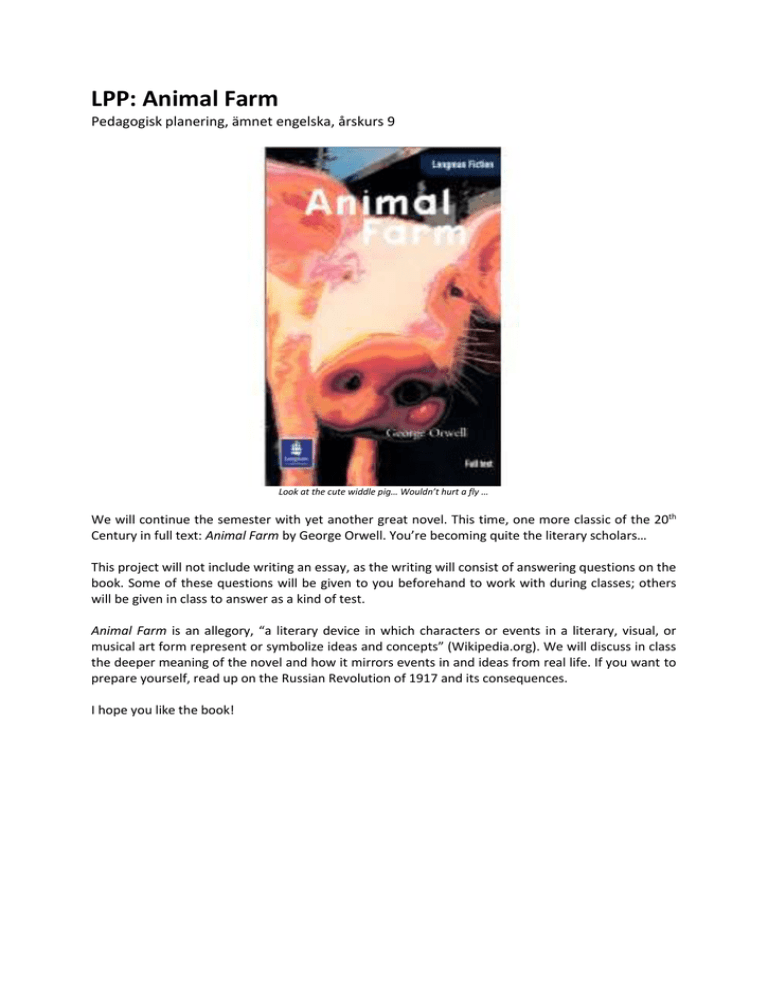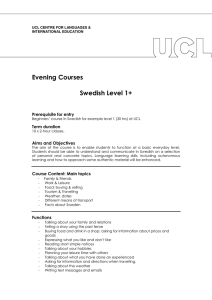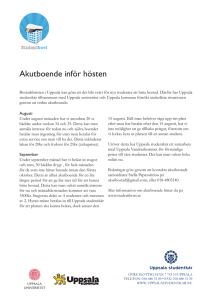Ämnesplanering English Animal farm 9C v45
advertisement

LPP: Animal Farm Pedagogisk planering, ämnet engelska, årskurs 9 Look at the cute widdle pig… Wouldn’t hurt a fly … We will continue the semester with yet another great novel. This time, one more classic of the 20th Century in full text: Animal Farm by George Orwell. You’re becoming quite the literary scholars… This project will not include writing an essay, as the writing will consist of answering questions on the book. Some of these questions will be given to you beforehand to work with during classes; others will be given in class to answer as a kind of test. Animal Farm is an allegory, “a literary device in which characters or events in a literary, visual, or musical art form represent or symbolize ideas and concepts” (Wikipedia.org). We will discuss in class the deeper meaning of the novel and how it mirrors events in and ideas from real life. If you want to prepare yourself, read up on the Russian Revolution of 1917 and its consequences. I hope you like the book! Lärandemål I arbetsområdet ska du få möjlighet att utveckla din förmåga att… Förstå och tolka innehållet i talad engelska och i olika slags texter Formulera sig och kommunicera i tal och skrift Använda språkliga strategier för att förstå och göra sig förstådda Anpassa språket efter olika syften, mottagare och sammanhang Reflektera över livsvillkor, samhällsfrågor och kulturella företeelser i olika sammanhang och delar av världen där engelska används Bedömning Underlag för bedömning är: • Texter du skriver om boken • Muntliga framställningar och samtal • Grammatikförhör • Läxförhör I arbetsområdet bedöms på vilket sätt du visar att du kan… • Skriftligt kommunicera på engelska • Muntligt kommunicera på engelska • Läsa engelska • Samt lite grammatiska regler Ur det centrala innehållet Kommunikationens innehåll: Intressen, vardagliga situationer, aktiviteter, händelseförlopp samt relationer och etiska frågor. Åsikter, erfarenheter, känslor och framtidsplaner Lyssna och lära – reception: Talad engelska och texter från olika medier Talad engelska med viss regional och social färgning Skönlitteratur och annan fiktion även i talad, dramatiserad och filmatiserad form. Sånger och dikter Fasta språkliga uttryck Hur sammanbindande ord och andra uttryck används för att skapa struktur och språkligt sammanhängande helheter. Tala, skriva och samtala – produktion och interaktion Samtal och diskussioner, samt argumentation Språkliga strategier för att förstå och göra sig förstådd när språket inte räcker till, till exempel omformuleringar, frågor och förklaringar Språkliga strategier för att bidra till och aktivt medverka i samtal genom att ta initiativ till interaktion, ge bekräftelse, ställa följdfrågor, ta initiativ till nya frågeställningar och ämnesområden samt för att avsluta samtalet. Undervisning: Vecka 45-50 Monday, 80 min w. 45 Practise for the National Test: Reading comprehension Friday 50 min Correct your incorrect sentences from the travel blog. An introduction to the term allegory. w. 46 Read introduction. Learn seven facts about Orwell. Listen to chapter one. Read chapter two. Work on assignments for chapters I -II. Continue reading. Seven facts about Orwell Work on assignments for chapters III-IV Continue reading Homework week 48: Chapters V - VI Homework: 7 facts. Read chapters 1-IV w. 47 Practise for the National Test: Listening comprehension Gymnasiedag w. 48 Animal idioms Grammar Test: Animal Idioms w. 49 w. 50 Read the book and work with the assignments. Book discussion Read the book and work with the assignments. Homework: Animal Idioms Homework: Chapters VII-VIII Grammar Grammar Read the book and work with the assignments. Read the book and work with the assignments. About the Russian Revolution Homework: Chapters IX - X Work with the assignments Test: Grammar Book discussion Finish the assignments and hand in your answers. Grammar Homework: Grammar Animal Farm By George Orwell Tips when reading: USE THE VOCABULARY LIST AT THE BACK OF THE BOOK! Assignments chapters I-II: Write in your note book. 1. List all of the animals and birds that you can think of that are commonly kept on a farm. What is each animal used for? What are the “children” of the animals called (griskulting, kalv, osv.)? Use a dictionary! 2. A. What type of animals are these? B: Describe their personalities. Use adjectives. Napoleon Mollie Major Squealer Pincher Boxer Moses Jones Muriel Clover Snowball Benjamin 3. Write the 7 Commandments that were written on the wall. 4. Put these events in order 1-8 The Rebellion The renaming of the farm Major’s death Mr Jones’ failure to feed the animals The visit to the farmhouse The development of Animalism Major’s speech The fire 5. Summarize, in your own words, old Major’s complaints about the conditions of farm animals. Assignments chapters III-IV: Write in your note book. 1. a. b. c. d. e. f. What are: The Rebellion? The Meeting? The Republic on Animals? The Wild Comrades’ Re-education Committee? Foxwood and Pinchfield? The battle of Cowshed? 2. Which tasks do the pigs take for themselves? What privileges do they have? 3. To what extent are the Seven Commandments being obeyed? In what ways do you think the relationship between the animals is going to change?

